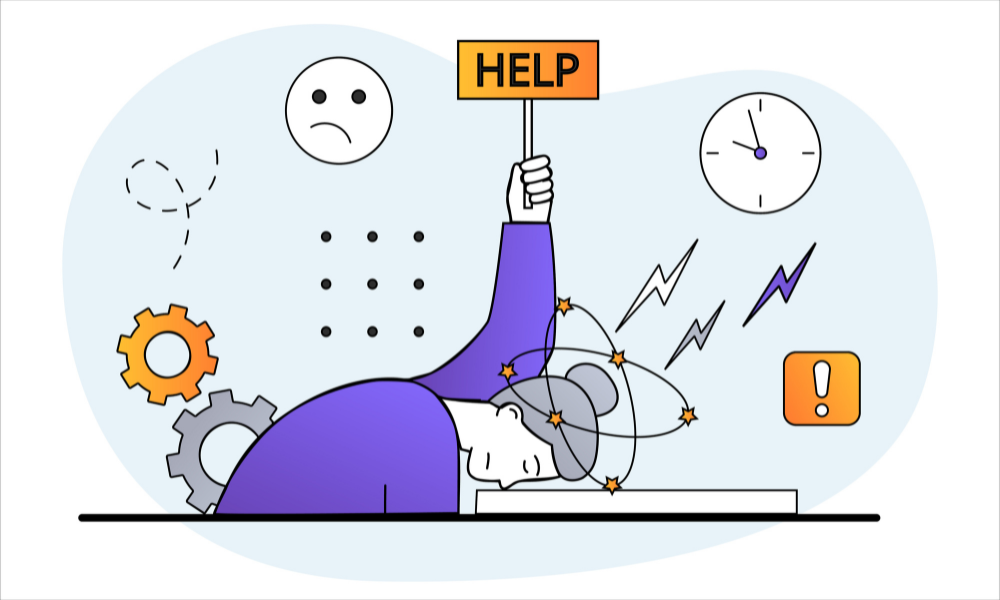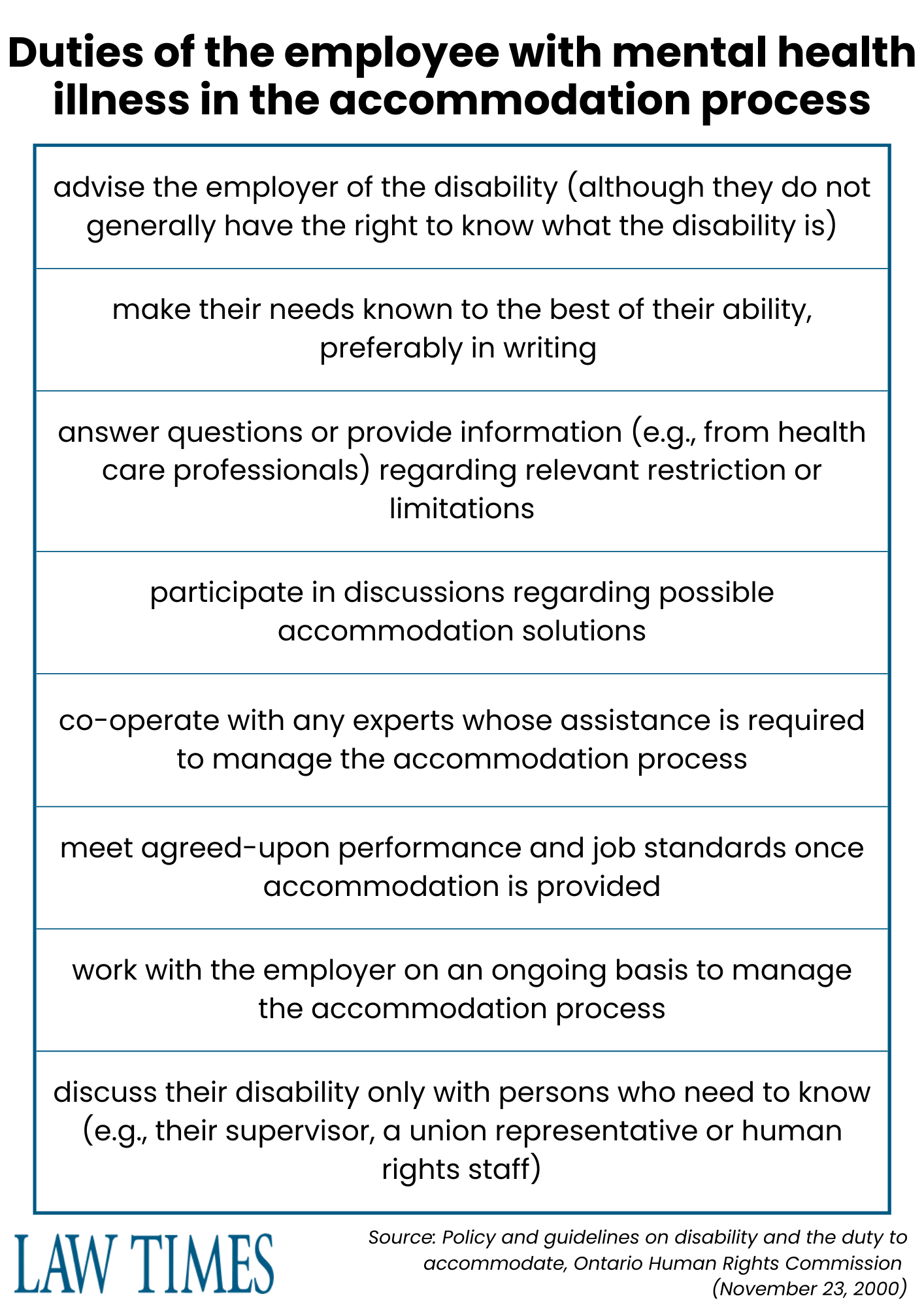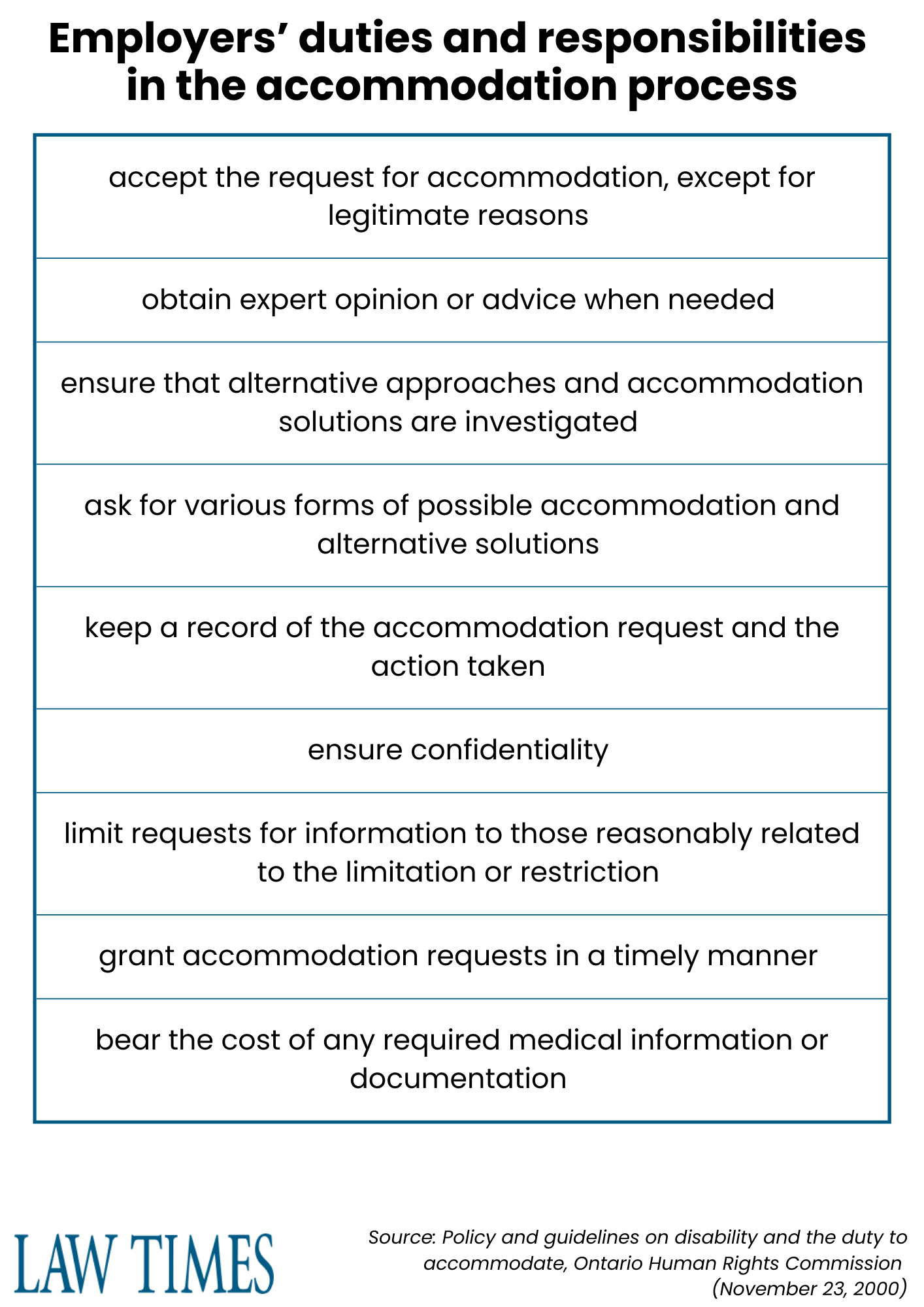
Employers are expected to know their legal duty to accommodate mental health illness. Learn more about this and how it operates in the workplace

As part of its April 2023 Labour Force Survey, Statistics Canada says that 7.5% of employees had taken time off from their jobs or businesses. This is because of stress or other mental health reasons for a period of 12 months before April 2023. In total, this amounted to 2.4 days lost on average over this period.
This statistic proves the importance of the duty to accommodate mental health illnesses in the workplace, for which employees and employers have a role for. To add, Ontario lawyers should also let clients know of an employer’s legal obligation under this legal duty.
Lawyers in Ontario can use this article to educate their clients, whether they’re employees or the employers of a given workplace.
The duty to accommodate is the responsibility of the employer to adjust the workplace according to the needs of every employee who needs accommodation. Also called workplace accommodations, the modification of the workplace that is required for employers is only up to the point of undue hardship. This is a statutory requirement under the Human Rights Code of Ontario (the Code), plus other legal bases, such as common law.
Federal and provincial laws prohibit discrimination based on a person’s:
This includes the prohibition of workplace discrimination against its own employees and the people whom the workplace serves.
As such, one of the ways to eradicate discrimination in the workplace is the duty to accommodate. Taken wholly, this duty is part of legally ensuring that every person has equal opportunities, access, and benefits in all aspects of life and employment.
Here’s a video shortly explaining what the duty to accommodate is:
Employers in Ontario can also reach out to a labour and employment lawyer when issues arise regarding the duty to accommodate mental health illnesses. Check out this Special Report by Canadian Lawyer Magazine, one of our sister publications, on the Top Labour and Employment Law Firms in Canada.
To further define “disability,” the Supreme Court of Canada (the Court) gave some interpretations which employers can work on. In Gibbs v. Battlefords & District Co-operative Ltd., 18 CHRR 384, the Court specified that, in the context of human rights and discrimination, the term “disability” includes mental illness.
Depending on the situation, the failure to accommodate an employee’s mental illness may constitute discrimination and give rise to human rights or employment law claims. As such, employers must ensure that they adequately address requests for accommodation in the workplace.
There’s no exhaustive list of possible mental illnesses considered a disability. However, there are certain criteria that employers can use, such as:
These will guide employers to the covered disabilities under the duty to accommodate. For instance, the definition of disability under the Code may seem exhaustive, but it’s only illustrative on what can be considered a disability. As such, it must be interpreted in broad terms, which can include non-evident disabilities, such as mental health illnesses.
This video gives a short explanation on the duty to accommodate mental health illnesses in the workplace:
To know more about this duty, workplace managers and HR professionals can reach out to the best employment lawyers in Ontario as ranked by Lexpert, one of our sister publications.
Common law provides that the duty to accommodate has two components:
As held in Lane v. ADGA Group Consultants Inc., 2007 HRTO 34, the failure of the employer to abide by these two components is considered a violation of their duty to accommodate. It’s also held that each component is as important as the other and the violation of the procedural aspect is discrimination in itself.
When an employee has expressly made known to their employer of their disability, such as a mental health illness, that will trigger the accommodation process. However, common law provides that there are instances when an employer cannot passively wait for an employee to request accommodation. For instance, when the employer is clearly aware, or when it’s clearly apparent, that the employee is having difficulties because of a disability.
This means that, as a good measure, employers must be proactive in keeping tabs on the mental health of their employees. They must also take initiatives when inquiring about their employees’ mental state.
Generally, the law provides the following rights to an employee under the duty to accommodate mental health issues:
Along with the rights of every employee are their responsibilities when exercising their rights under the duty to accommodate mental health illnesses. Not following these may impute bad faith on their part, which may justify any actions against them, such as dismissals.

On the other hand, this duty to accommodate mental health illnesses also imposes certain responsibilities on the employees.
For starters, the presence of a mental illness must be substantiated by expert medical evidence. When an employee is claiming that they were wrongfully dismissed due to a mental disability, there must also be a connection between the disability and the employee’s poor performance. If there is no connection, the employer’s decision to dismiss the employee cannot be barred by an employee’s claim of discrimination.
The presence of a mental disability cannot also be used to justify disciplinable conduct, or an employee’s claim may be dismissed, where:
Unfortunately, employers often do not know how to go about developing and implementing strategies to assist those with mental health issues. Unlike physical disabilities, where the accommodation necessary is generally obvious and straightforward, mental health issues may require complex environmental, social, and logistical accommodations. For this reason, it is important to understand the status of the law with respect to this issue.
As summarized by the OHRC, here are the measures that an employer (also called an “accommodation provider”) is required to do under their duty to accommodate:

In general, the duty to accommodate is not meant to unfairly cater to employee preferences or be unduly onerous for the employer. It is intended to remove discriminatory barriers up to the point of undue hardship. The question that follows is: What is the point of undue hardship?
There is currently no set formula for determining what constitutes undue hardship. The court will generally consider the context, including the following:
A common thread throughout the case law is that policies and procedures must be amenable to those with mental health issues.
The court has emphasized that employers need to act with empathy. Mental health issues and the way they manifest themselves vary. As such, the nature of the accommodation will change from person to person.
For example, an employer’s policy may mandate that employees be assessed by a company-selected psychiatric expert prior to being accommodated. However, there are times when the employee has legitimate reservations about the company’s assessment policy. Here, it may be appropriate to allow the employee to be assessed by their existing psychiatrist.
The basic principle is that following internal policies and procedures to the letter may fall shy of the employer’s duty to accommodate. In other words, though company policies and procedures may be robust, the need to go beyond them in order to accommodate an employee does not necessarily constitute undue hardship. For that reason, each case requires a tailored approach.
Employer-provided insurance policies should not treat those with mental disabilities and those with physical disabilities differently.
Under an employer’s insurance policy, a person with a physical disability may be offered extensive rehabilitative services. Equity dictates that employees with mental disabilities should also be offered a comparable range of services.
Similarly, where an insurance policy has a five-year time limit on replacement income for those with physical disabilities, the same time limit should apply to those with mental disabilities.
In other words, mental and physical disabilities should be treated equally.
To summarize these best practices:
With respect to the accommodations being offered, the employer is allowed some compromises, which may balance things out:
For example, when attendance at the workplace is a critical component of the job, the employer may have an internal policy regarding innocent absenteeism. If the employee is chronically absent due to their mental illness, dismissal for excessive absenteeism arising from a mental disability may be justified. This is applicable only if there are no suitable alternative positions or work arrangements within the company.
Again, the facts of the case will need to be considered.
Just like conditions and disabilities that are physically apparent, mental conditions can also affect an employee’s day-to-day work. To address this, the law has imposed a duty to accommodate mental health illnesses, aside from other permissible forms of discrimination in the workplace. While an employer is entitled to a productive employee, the employee is also equally entitled to an empathetic and flexible employer. In balancing these two, it’s hoped that workplaces will become more inclusive and productive for everyone.
Bookmark our Professional Regulation page for regular updates on employment law for law firms, such as the duty to accommodate mental health illnesses.
Contributors to this article include Tanya Walker, a Toronto litigation lawyer at Walker Law PC and a bencher of the Law Society of Ontario, and Jordan Routliff, now a partner at Rousseau Mazzuca LLP.